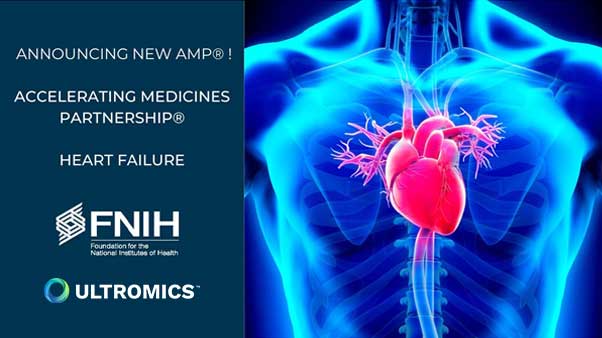
Ultromics joins FNIH partnership to transform heart failure detection
- | By Ultromics
- Press Release
Ultromics, a digital health technology company pioneering the development of transformative heart failure diagnostics, has joined as a full partner The Accelerating Medicines Partnership® Heart Failure (AMP® HF) including the National Institutes of Health (NIH) and the National Heart Lung and Blood Institute (NHLBI), managed by the Foundation for the National Institutes of Health (FNIH).
The 5-year, $37 million multi-stakeholder collaboration brings together partners from the public and private sectors across the world to investigate the syndrome of heart failure with preserved ejection fraction (HFpEF).
Ultromics is the world leader in applying artificial intelligence to echocardiography and recently received breakthrough status from the FDA for the first HFpEF diagnostic algorithm that, in a few seconds, can accurately detect HFpEF by analyzing the motion of the heart chamber walls from a single echocardiography image with unprecedented accuracy and precision1. This significant technological and clinical breakthrough has potential to replace the considerable time and skill required by current clinical practice, such as applying Doppler to echocardiograms, as well as limit the need for costly and more invasive procedures such as right heart catheterization – the combination of which continue to miss 1 in 4 patient’s HFpEF diagnosis2.
Developing precision treatment strategies for HFpEF is more critical than ever, as HFpEF represents over 50% of heart failure patients globally, and heart failure cases and costs are expected to double between now and 20303. Further, as the world’s population continues to live longer, HFpEF is rising in prevalence relative to other forms of heart failure. Utilizing innovative technologies, including digital measurements and artificial intelligence, the AMP HF Program aims to alter the landscape of heart failure detection and treatment through deeper understanding and phenotyping of HFpEF and the development of targeted therapies, improving the outlook for millions of patients around the world.
Ultromics’ current and future AI solutions will be a critical tool in the AMP HF Program arsenal, and the collaboration is certain to advance the application of AI to achieve earlier and more accurate detection and mapping of appropriate and effective treatment options for HFpEF. These planned advancements will add to what has already been deemed significant breakthroughs in HFpEF treatment. Within the last 12 months, a new class of drug originally used in diabetes treatment—SGLT2 inhibitors—have shown a significant benefit to mortality and hospitalizations in patients diagnosed with HFpEF4. Ultromics participation in the AMP HF Program seeks to expand and accelerate novel and more effective techniques using AI and machine learning.

Dr Ross Upton, CEO and Founder of Ultromics, said, “We are truly honored to be joining this global partnership to contribute to the clinical advances of heart failure detection and treatment. Although compelling progress has been made in the treatment of many forms of heart disease, death due to heart failure continues to rise nationally.”
Dr Upton, added, “Ultromics’ mission is to help prevent heart failure hospitalizations by applying AI to echocardiography images enabling clinicians to make precision diagnoses that map to treatment pathways. Joining the AMP HF Program, together, we will redefine the heart failure care pathway, and contribute to the goal of improving patient outcomes.”
The promise of precision treatments for heart failure is that we will have the opportunity to diagnose individuals much earlier and intervene, changing the course of this disease,” said NHLBI Director Dr. Gary H. Gibbons. “The AMP Heart Failure program—and the high caliber of the partnership at its core—will help us better understand and treat this common syndrome with the goal of ultimately benefiting millions.”
In the United States, heart failure directly contributes to about 45% of all cardiovascular disease deaths.5 HFpEF is a common form of heart failure in which the ejection fraction—the percentage of blood ejected from the left ventricle with each heartbeat—is within the normal range. HFpEF is difficult to detect, because the left ventricle is functioning normally, and is often deadly, with a five-year survival rate of just 35-40%. In addition to a high risk for mortality, patients with HFpEF live with declining quality of life and poor capacity to perform tasks of daily living.
The AMP HF Program, a public-private partnership facilitated by the FNIH, will advance our understanding of heart failure with preserved ejection fraction using two complementary and integrated research components: analyzing existing HFpEF datasets, sourced from public and private sector funded studies, and initiating a new clinical trial to confirm retrospective findings in an observational cohort with a goal to develop a framework for new precision treatments.
“HFpEF is clearly a major cause of heart failure hospitalizations and diminished quality of life for older patients. Up until now, developing effective therapeutic strategies to identify and treat HFpEF has eluded us. Through AMP HF, we will harness the valuable perspectives and expertise that collaborations bring to biomedical research, paving the way for a more hopeful outlook,” said Dr. Julie Gerberding, Chief Executive Officer at the FNIH.
“Half of all heart failure patients suffer from HFpEF. Understanding what it is, when it happens, and how to treat it remains the single largest unmet need in cardiovascular health.6 The AMP HF Program aims to close this gap in understanding, and improve the lives of patients everywhere,” said Dr. Norman Stockbridge, Director of the Division of Cardiology and Nephrology at the Office of Cardiology, Hematology, Endocrinology and Nephrology at the U.S. Food and Drug Administration (FDA).
AMP Heart Failure is the latest initiative to emerge from the AMP Program, a set of public-private collaborations that coalesce the collective knowledge of the NIH, the U.S. FDA, the biotech and pharmaceutical industry, and patient organizations to speed drug development across different diseases. AMP HF brings together the resources of 8 partner organizations spanning the public and private sectors, with combined commitments totaling over $37 million. The FNIH will provide project management for the effort over the next 5 years.
About the Accelerating Medicines Partnership Program: AMP Heart Failure joins other AMP programs expediting discovery around Alzheimer’s disease, Parkinson’s disease, Schizophrenia, Rheumatoid Arthritis and Lupus, Type II Diabetes, Common Metabolic Diseases, Autoimmune and Immune-Mediated Diseases, and the Bespoke Gene Therapy Consortium, all coordinated by the FNIH since the 2014 launch of the large-scale initiative. The AMP partnerships use cutting-edge scientific approaches to bring new medicines to patients by enhancing the validation of novel, clinically relevant therapeutic targets, and biomarkers.
To learn more about AMP, visit https://fnih.org/AMP.
About the Foundation for the National Institutes of Health
The Foundation for the National Institutes of Health (FNIH) creates and manages alliances with public and private institutions in support of the mission of the NIH. The FNIH works with its partners to accelerate biomedical research and strategies against diseases and health concerns in the United States and across the globe. The FNIH organizes and administers research projects; supports the education and training of new researchers; organizes educational events and symposia; and administers a series of funds supporting a wide range of health issues—all efforts focused on areas of unmet need, paving the way toward better patient experiences and outcomes. Established by Congress in 1990, the FNIH is a not-for-profit 501(c)(3) charitable organization.
For additional information about the FNIH, please visit https://fnih.org.
About the National Institutes of Health (NIH)
NIH, the nation's medical research agency, includes 27 Institutes and Centers and is a component of the U.S. Department of Health and Human Services. NIH is the primary federal agency conducting and supporting basic, clinical, and translational medical research and is investigating the causes, treatments, and cures for both common and rare diseases.
For more information about NIH and its programs, visit https://www.nih.gov/.
About Ultromics
Ultromics is a pioneer in advanced heart failure detection. The groundbreaking platform is transforming the way heart failure is diagnosed using artificial intelligence and cardiac ultrasound as a modality. The clinically proven pathway empowers clinicians to make precise, efficient, and accurate heart disease detection, leveraging the largest known heart disease outcomes dataset in echocardiography, accurately interpreting echocardiograms, and predicting cardiac outcomes. The technology has been built in collaboration with Mayo Clinic and NHS England and has over $50 million raised capital to support continued innovation - with the likes of Blues Ventures, Optum, and Google Ventures. They are backed by the largest US health insurance firms with 2 FDA clearances including a breakthrough designation. Ultromics mission is to stop Heart Failure in its tracks with precision diagnostics. https://www.ultromics.com
References:
- Kapłon‐Cieślicka A, Laroche C, Crespo-Leiro MG et al. Is heart failure misdiagnosed in hospitalized patients with preserved ejection fraction? From the European Society of Cardiology‐Heart Failure Association EURObservational Research Programme Heart Failure Long‐Term Registry. ESC heart failure. 2020;7:2098-2112.
- Savarese G and Lund LH. Global public health burden of heart failure. Cardiac Failure Review. 2017;3:1:7-11.
- Solomon SD, McMurray JJV, Claggett B, et al. Dapagliflozin in Heart Failure with Mildly Reduced or Preserved Ejection Fraction. The New England Journal of Medicine. 2022;22;387:1089-1098
- https://hfsa.org/research/hfsa-scientific-statements
- Oktay AA, Rich JD, & Shah SJ. The emerging epidemic of heart failure with preserved ejection fraction. Current Heart Failure Reports, 2013;10:401-410.
Curious about upcoming research and innovation?
Sign up to hear about the latest news.

